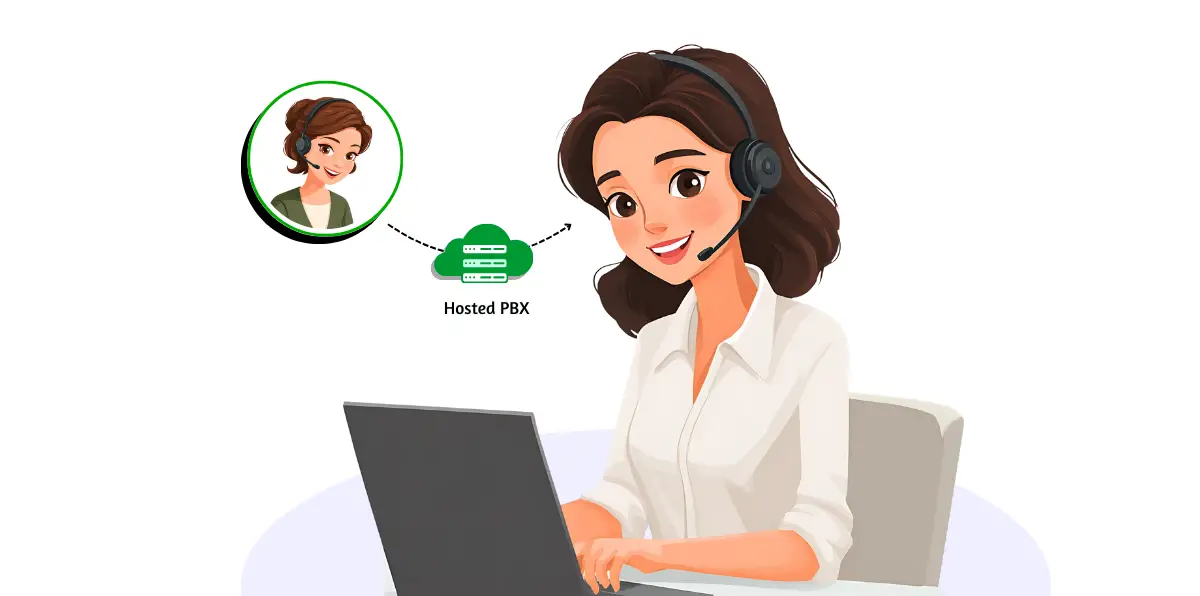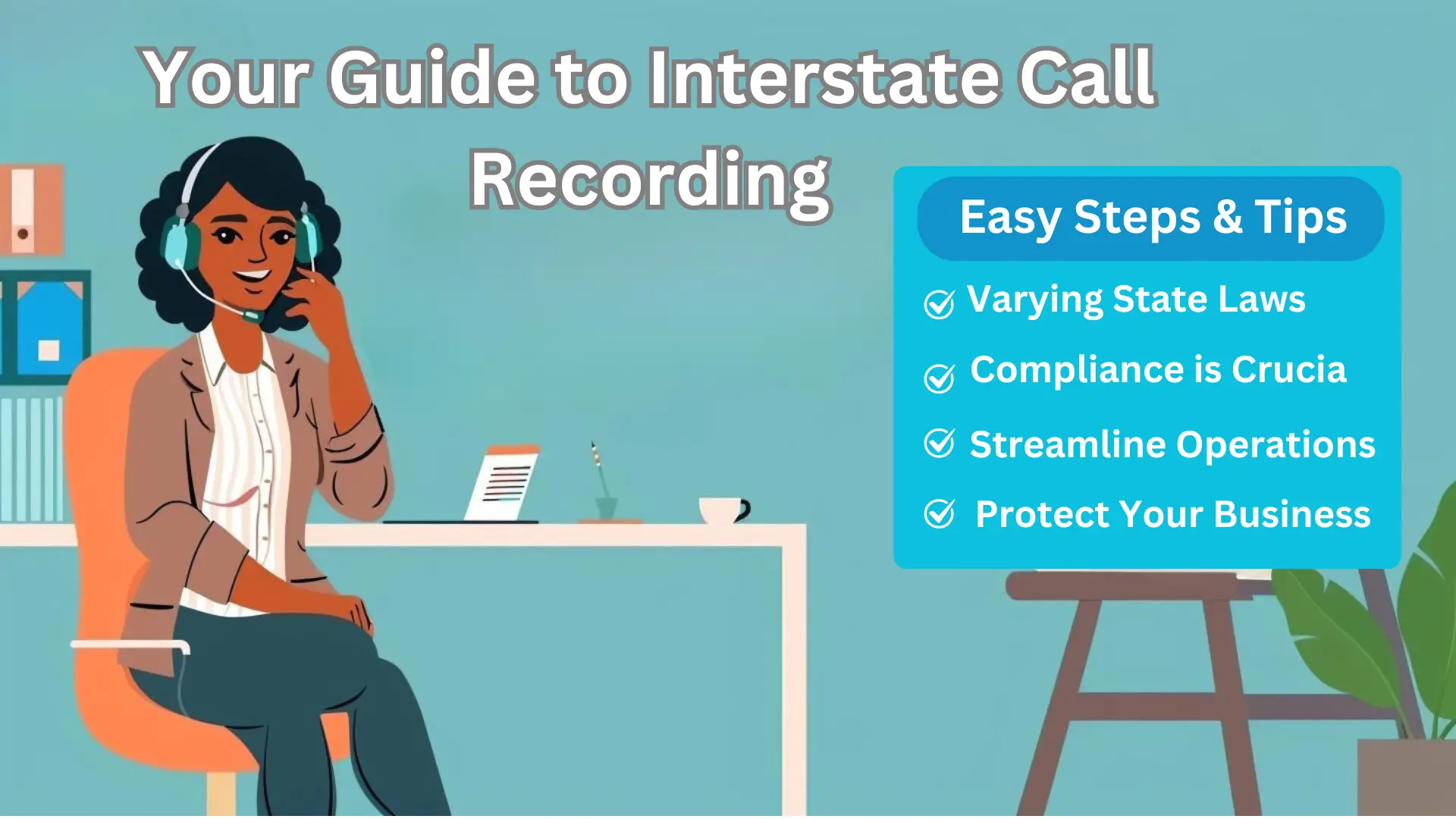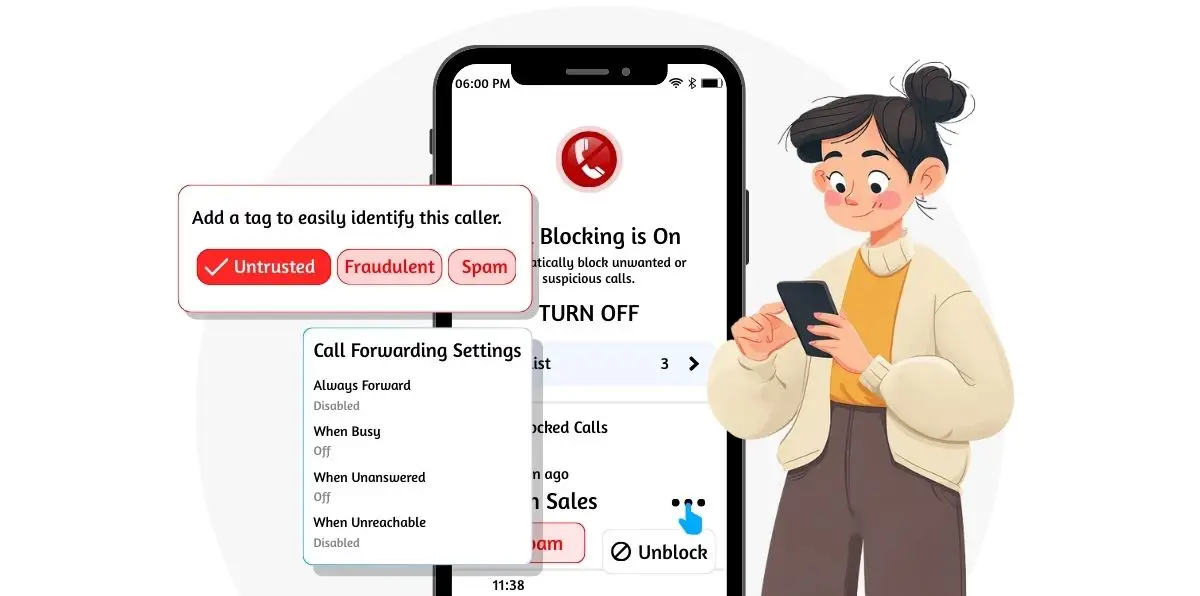Introduction
Is your business still tethered to a clunky, outdated phone system? If you’re tired of costly on-site equipment, surprise maintenance bills, and a setup that ties your team to their desks, it’s time for an upgrade. Modern businesses demand flexibility, and that’s where hosted VoIP steps in.
Think of it this way: a traditional phone system is like owning DVDs—costly hardware, manual setup, and constant maintenance. Hosted VoIP is like Netflix for business calls: a cloud-based, feature-rich phone service streamed over the internet with no hardware or IT hassle. This guide breaks down how hosted VoIP works, why it outperforms legacy systems, and how to choose the right solution to future-proof your business.
What Is Hosted VoIP? A Clear Definition
Hosted VoIP (Voice over Internet Protocol) is a cloud-based phone system where a third-party provider owns, manages, and maintains all the technology in their secure data centers. Instead of using traditional copper phone lines, your business calls are converted into digital data and transmitted securely over your existing internet connection.
This eliminates the need for a complex and costly on-site Private Branch Exchange (PBX). All you need are IP-enabled phones or a simple softphone app on your computer and smartphone to access a powerful communication suite.
How Does Hosted VoIP Actually Work?
The technology behind a VoIP call is sophisticated, but the process is simple and happens in milliseconds.
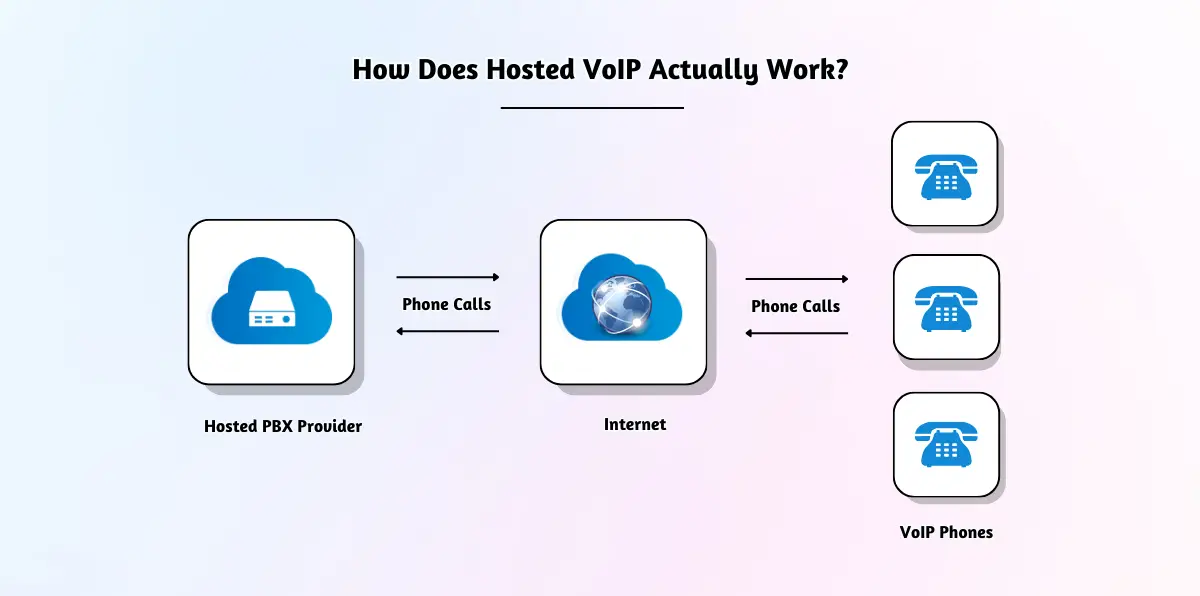
- Your Voice is Digitized: When you speak, a technology called a Codec inside your IP phone or app instantly converts your analog voice into compressed digital data packets, like turning a photo into a JPEG.
- Packets Travel Over the Internet: These data packets are sent through your router over the internet. Using a protocol like SIP (Session Initiation Protocol), the packets are addressed and routed to your VoIP provider’s data center.
- The Cloud PBX Manages the Call: At the provider’s data center, their “Cloud PBX” acts as the brain. It reads the destination address, instantly routes the call, and manages all your advanced features like auto-attendants, call forwarding, and even a cloud contact center.
- The Call is Reassembled: At the recipient’s end, the process reverses. The packets are reassembled in order, and the codec converts them back into clear audio. This round trip is so fast the conversation feels completely seamless.
Hosted VoIP vs. Traditional Phone Lines (POTS)
The move to Hosted VoIP is a fundamental shift from physical hardware to intelligent software, which changes everything for your business.
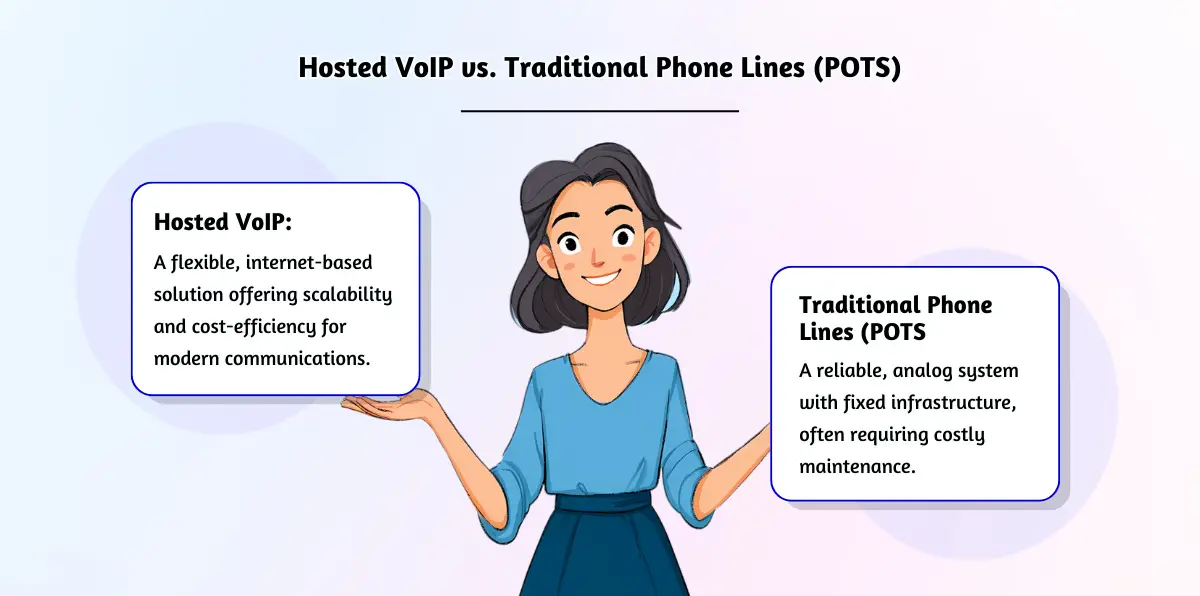
| Feature | Hosted VoIP | Traditional Phone Line (POTS) |
| Technology | Digital (Software & Internet Protocol) | Analog (Physical Copper Wires) |
| Upfront Cost | Low to none | Extremely High (On-site PBX hardware) |
| Maintenance | Handled 100% by the provider | Managed and paid for by your IT team |
| Scalability | Instant. Add users online in minutes. | Difficult, costly, and requires technicians. |
| Features | Rich suite included in one price | Basic. Advanced features cost extra. |
| Flexibility | Excellent. Work from any device, anywhere. | Poor. Tied to a physical wall jack. |

Top Hosted VoIP Features Every Business Needs
Businesses are switching to VoIP because the advantages create a direct competitive edge.
Drastic Cost Reduction: Eliminate the massive capital expense of an on-premise PBX. With a predictable per-user monthly fee, businesses often reduce their phone bills by up to 60%, benefiting from free inter-office calls and cheaper long-distance rates.
Unmatched Mobility & Remote Work: Your business phone number is no longer tied to a desk. Employees can use their official line on a desk phone, a laptop softphone, or their personal smartphone, enabling seamless remote and hybrid work.
Powerful, Enterprise-Grade Features: Access dozens of tools that project a professional image and improve efficiency, including a virtual receptionist, advanced call routing, and voicemail-to-email transcription.
Effortless Scalability: As your business grows or changes, you can add or remove users instantly through an online portal. The system scales with your needs without requiring new hardware or technician visits.
Zero Maintenance or IT Headaches: The provider handles all software updates, security patches, and system maintenance. This frees your IT team to focus on core business initiatives, not a depreciating phone system.
Superior Reliability & Business Continuity: Top providers guarantee 99.999% uptime (less than 6 minutes of downtime per year) through geo-redundant data centers. If your office loses power or internet, calls automatically forward to mobile phones, so you never miss a customer call.
Advanced Analytics and Insights: Gain valuable data on call volumes, wait times, and agent performance. Use these insights to make data-driven decisions that improve customer service and boost team productivity.
Essential Hosted VoIP Features for Business Productivity
Look for tools that solve your biggest communication challenges, not just a long list of features.
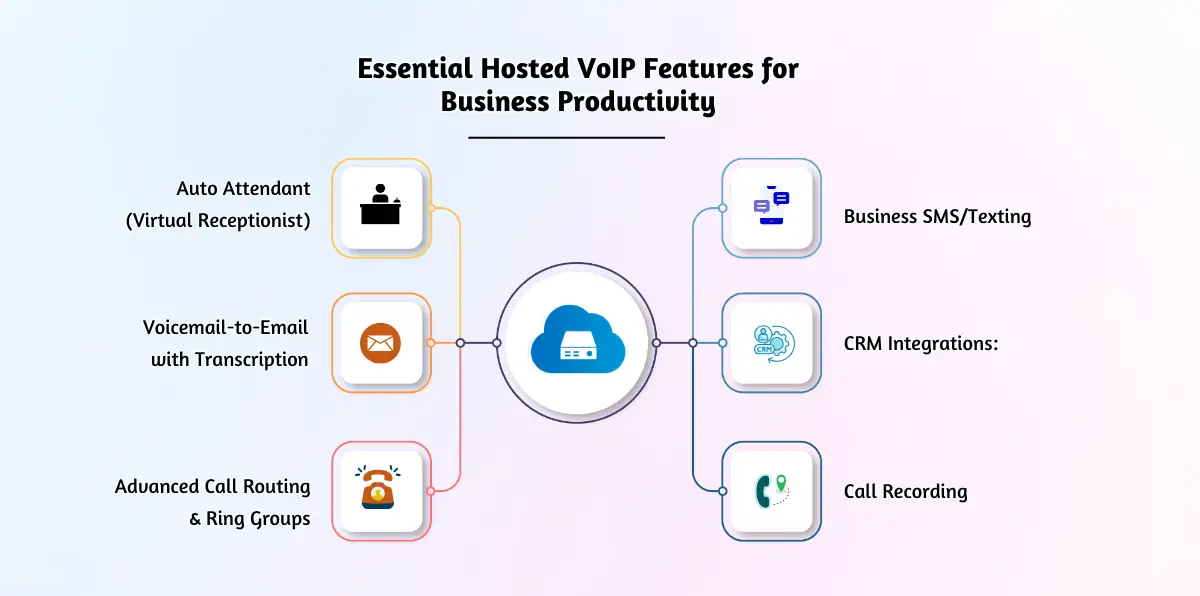
- Auto Attendant (Virtual Receptionist): This feature greets every caller with a professional menu (e.g., “Press 1 for Sales”) and routes them correctly 24/7, ensuring a great first impression.
- Advanced Call Routing & Ring Groups: Create smart rules to send calls to the right place based on time of day or caller ID. Ring multiple people at once or in a specific sequence to guarantee the most qualified person always answers.
- Voicemail-to-Email with Transcription: Get voicemails delivered to your inbox as audio files with a full text transcription. You can read a message in seconds to prioritize callbacks, even in a meeting.
- Call Recording: Automatically or manually record calls for quality assurance, employee training, or dispute resolution. It’s an invaluable tool for protecting your business and coaching your team.
- Business SMS/Texting: Send and receive texts from your official business number on your computer or mobile app. This keeps communications professional and centralized.
- CRM Integrations: Connect your VoIP system to tools like Salesforce or HubSpot. An incoming call can trigger a “screen-pop” with the customer’s history, giving your team instant context for a smarter conversation.
Reduce expenses and lighten IT’s workload.
What Hardware Do You Need for Hosted VoIP?
VoIP offers excellent hardware flexibility. Your main options are:
- IP Phones: Desk phones that connect directly to the internet, offering the highest call quality.
- Softphones: A software app for your computer or smartphone that functions as your business phone, used with a headset.
- Analog Telephone Adapters (ATA): A small device to connect an existing analog phone or fax machine to your VoIP network.
Most businesses use a mix of IP phones for in-office staff and softphones for remote employees.
On-Premise vs. Hosted VoIP vs. UCaaS: Which Is Right for You?
- On-Premise VoIP: You buy and manage all hardware and software on-site. Best for large enterprises with dedicated IT staff and unique security needs.
- Hosted VoIP: A provider manages the entire system in the cloud for a monthly fee. Best for nearly all small to medium-sized businesses (SMBs) seeking powerful features with low cost and high flexibility.
- UCaaS (Unified Communications as a Service): The evolution of VoIP, integrating voice, video, and team chat into a single platform. Best for modern, agile teams looking to consolidate all communication tools into one app.
Expert Tip: If you need a powerful, flexible phone system, Hosted VoIP is perfect. If you want to unify all communications (phone, video, chat), UCaaS is the better long-term choice.

How to Choose the Right Hosted VoIP Provider
Ask these five critical questions to vet potential partners:
What is your uptime guarantee, and how do you ensure it?
Look for a financially-backed SLA for 99.999% uptime and ask about geo-redundant data centers for disaster recovery.
What does your customer support look like for an urgent issue?
Demand 24/7/365 live support via phone. Check third-party review sites like G2 to see what real customers say about their support.
How do you protect my calls and data?
Ensure they use call encryption (TLS/SRTP). If you’re in a regulated industry, confirm they can support requirements like HIPAA.
Can you show me a full quote with all taxes and fees?
Look for clear, all-inclusive plans and ask directly about hidden fees for setup, number porting, or other services.
Can I see a demo of your admin portal?
The portal should be intuitive, allowing you to easily add users and change call routing yourself without needing technical support.
Conclusion:
Choosing a phone system is no longer just an IT decision; it’s a strategic business move. Clinging to an on-premise system means accepting high costs, rigid infrastructure, and a communication style that limits your growth. Hosted VoIP fundamentally reverses this. It transforms your phone system from a depreciating hardware expense into a flexible, software-driven asset.
By migrating to the cloud, you are investing directly in agility, empowering your team to work from anywhere, and future-proofing your operations with a platform that scales at the click of a button. The question isn’t just about modernizing your calls—it’s about equipping your business with the competitive edge it needs to thrive in the years to come.

Frequently Asked Questions (FAQ's)
What's the difference between Hosted VoIP and Hosted PBX?
They are the same thing: a cloud-based phone system where a provider manages the PBX technology for you. “Hosted VoIP” is the more common term.
Can I keep my existing business phone number?
Yes. Reputable providers handle “number porting,” transferring your existing numbers to their service with no downtime.
What internet speed do I need for Hosted VoIP?
A stable connection is more important than raw speed. Each call only uses about 100 kbps, so a standard business connection is more than enough.
What happens if my office internet goes out?
Your system automatically forwards calls to backup numbers, like mobile phones, so you never miss an important call during an outage.
Is Hosted VoIP secure?
Yes. Top providers use call encryption and secure, monitored data centers to keep your business communications private and protected.


